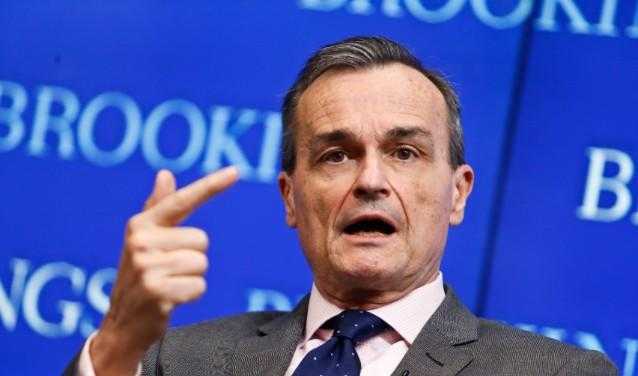Home>Reflections of an Ambassador to the USA in the Trump Era

08.10.2019
Reflections of an Ambassador to the USA in the Trump Era
“In French, we would say Gérard Araud est très cash”, concluded Frédéric Mion, President of Sciences Po, towards the end of his introduction of the experienced diplomat. The phrase referred to the former Ambassador’s famously blunt honesty, which is something that made him a uniquely insightful guest at the conference that took place on the occasion of the launch of his memoirs, titled Diplomatic Passport: 40 Years at the Quai d’Orsay (FR). Organised by the Paris School of International Affairs, the event allowed students to have their most pressing questions about diplomacy and international relations answered by a man whose career as a diplomat spanned nearly four decades.
“Western domination was leading to a very well known phenomenon - hubris”
The alumnus of Sciences Po’s Public Service section joined the ENA (National School of Administration) in 1978, after which began his journey at the Quai d’Orsay in 1982. He would occupy several high-profile and prestigious positions during his career, most notably of the Ambassador of France in Israel (2003-06), Director General for Political Affairs and Security at the Quai d’Orsay (2006-09), Permanent Representative of France to the UN Security Council (2009-14), and finally as Ambassador to the United States (2014-19). His expertise was focused on the US and the Middle East, and he participated in and bore witness to several important moments in recent history - France’s decision to oppose the US invasion of Iraq in 2003, the negotiations with Iran on the nuclear treaty, the UN Security Council Resolution on Libya in 2011, the Arab Spring, the Syrian Crisis, Russian aggressions in Georgia and Crimea, and the election of Donald Trump, to name but a few. In all these events, he saw the gradual devolution of what he described as a ‘neo-liberal’ era, undone in part by hubris on the part of the western powers.
“You have to sit down with your adversary and try to find the compromise, working with him; that's diplomacy.”
The ex-Ambassador had quite a few lessons to give on the art of diplomacy and negotiation. The current diplomatic crisis between Iran and the United States was his go-to example, illustrating in particular the differing natures of the heads-of-state involved - Trump, Macron and Rouhani, and the particularities of each administration behind these leaders. When discussing methods designed to ensure compliance with international law, he conveyed his distrust of the effectiveness of sanctions. Not only are they being used too freely in his opinion, but there are serious questions over whether they are properly enforced or not. Referring to them as “an abdication of diplomacy”, he promoted the use of negotiations and compromise, and to use sanctions only as a means of pressuring belligerents to come to the negotiating table.
“I’d deleted the tweet after 45 seconds, but it was too late.”
The neo-liberal world order was, according to the esteemed guest, shaken up in the last half-decade or so. “After Brexit, after Trump, suddenly I realised that something very important and very serious was happening throughout the western societies.” Referencing a now-infamous tweet, he said that he believed a world order was collapsing, but it was not the liberal world order as a whole, but rather the western liberal order. Gone was the post-Soviet era of transatlantic domination, and gone are the days where the western countries were seen as benign powers. Comparing the UN to ‘a fishbowl where every country is represented’, he mentioned the importance of treating countries equally, regardless of diplomatic or traditional ties. “We, the west, love our high moral ground, but it is partly hypocritical.” The emergence of China, the re-emergence of Russia and the desire of India to be a major global player have all shifted the balance of power in the world. This has been accompanied by a change in the zeitgeist within western countries themselves, manifested in the form of populist movements across the US and Europe that seek to negate the neo-liberal policies that were taken as the norm during the last four decades.
In his closing remarks, the former Ambassador paid special tribute to former Permanent Representative of Lebanon to the UN Security Council and another alumnus of Sciences Po, Nawaf Salam, who was in attendance lending even more lustre to the occasion.
Related links: